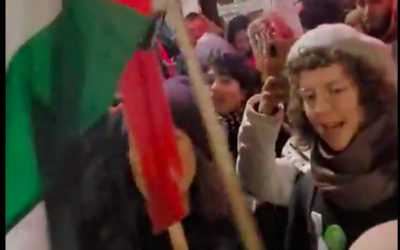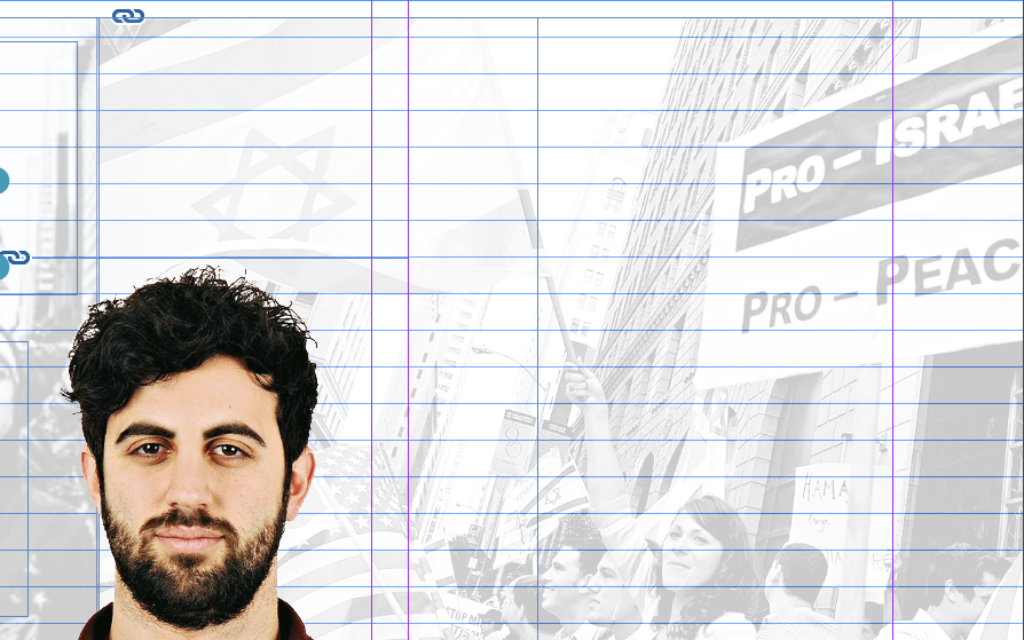OPINION: Josh Glancy on how the October pogrom knocked Baddiel off his fence
The massacre showed British Jews that, like it or not, our lives are inextricably linked to Israel's
There used to be a fence you could sit on. It was David Baddiel’s fence. Many other people have sat on this fence over the years, but I have come to think of it as Baddiel’s. Let me explain.
David Baddiel, comedian, author, composer of legendary football ditties, pre-eminent chronicler of modern antisemitism, is proudly and openly Jewish. He is not religious, but culturally he’s a tribesman and always will be. With some people you can just tell.
Yet Baddiel has never been keen on Israel nor wanted to be associated with it. He is not so much an anti-Zionist Jew as a non-Zionist Jew. It’s nothing much to do with him and he resents people asking him about it. Diaspora Jews, he’s always argued, are not defined by the actions of Israel.
Get The Jewish News Daily Edition by email and never miss our top stories Free Sign Up
Intellectually, this position is perfectly coherent. Practically, however, it has of late been found wanting. Over the past six weeks, Baddiel’s fence has all but collapsed; washed away by a tide of antisemitism; subsumed by a pogrom that struck fear and anguish into nearly every Jewish heart on the planet; bulldozed by a war that cares nothing for elegantly constructed diasporic identities. Even Baddiel is now talking about Israel. “My emotional response to that day overwhelmed my normal sense of disengagement,” he wrote recently, explaining why he took the unusual step of going on the BBC to talk about Israel after October 7.
Because the antisemites are not distinguishing. Those who write “Free Gaza” on the sign for The Wiener Holocaust Library don’t care about Baddiel’s fence. Those who say Hitler was right all along, that the Jews are thirsty for blood and control the media, aren’t interested in making distinctions. As it searches for Jews to kill behind rocks and trees, Hamas is absolutely not interested in making distinctions.

And let’s be honest, many Jews have all but done away with these distinctions too. In the aftermath of October 7, my Instagram was full of posts from understandably distraught Jewish mates asking why their gentile friends hadn’t been in touch to offer solidarity. The events of that day have been described as an attack on Jews everywhere. These sentiments are, of course, understandable, but they make the separation between Jews and Israel ever harder to unpick. Is it we who were attacked? Or them? Or both? I’m not sure we even fully understand the complexity of this relationship sometimes, so how are others supposed to?
Over a period of 120 years or so, for many (though by no means all) British Jews, Israel and Judaism have become inextricably linked. It wasn’t always so. In the early 20th century, when Zionism first grew into a mainstream movement, many British Jews resisted it. The strictly-Orthodox had little interest in secular nationalism. Many of the old Anglo-Jewish elites resisted the idea too, worrying that it would sully the post-Enlightenment freedoms and acceptance for which they had worked so hard. They worried, as Claude Montefiore put it, writing in response to the Balfour Declaration in 1917, that Israel would make diaspora Jews “strangers in their native lands”.
This has not come to pass, thankfully. Montefiore was wrong about this, in part because he couldn’t have anticipated then that Britain would become a multicultural, multiethnic rainbow nation, in which a secondary affiliation to a distant Middle Eastern country is far from unusual. Anglo-Zionism was a forerunner of so many split identities that we see today.

Montefiore and co also lost their battle: after the Balfour Declaration, Zionism – as in a foundational support for the existence of a Jewish state in Israel – rapidly became a dominant feature of mainstream Jewish identity in Britain. The Holocaust and establishment of the actual state of Israel in 1948 pretty much settled the matter. It became a necessary reality.
Today, Israel is a key part of how most of us identify as Jews: eating hummus and labneh, reading Ha’aretz or i24, smoking nargilah in Herzliya, going on Tour, Pesach in Tel Aviv. As a child, the words to Hatikvah were printed at the end of every Grace After Meals benscher. To remind us of the homeland.
Baddiel has often argued, correctly, that to hold British Jews responsible for the actions of Israel is deeply unfair, racist even. But it’s happening anyway.
This relationship is so thick, so deeply felt, so central to our self-conception as Jews, that the “from the river to the sea” chant, the one we’ve heard so many times on British streets in recent weeks, is viewed by many people as functionally antisemitic and as a calls for the destruction of Israel, however violent or peaceful the intentions of those chanting it.
On a deep emotional level, it feels as though they’re chanting for our destruction too.
Baddiel has often argued, correctly, that to hold British Jews responsible for the actions of Israel is deeply unfair, racist even. But it’s happening anyway. Because in moments of genuine crisis, what we’ve seen is that a tide of fierce hatred washes over that delicate ambivalence.
It’s happening on our side too. All those words and boundaries that we’ve been policing so carefully – what is anti-Zionism vs antisemitism, anti-Israel vs anti the current policies of the Netanyahu government – they all fell away in the face of the mass genocidal slaughter we saw on October 7. They all seem like nit picking in response to the 240 hostages being held in Gazan tunnels, or the bitter, destructive war that Israel is now waging in response. It all hits us on a visceral, ancestral level, almost beyond political language.
This, of course, is part of what the original Jewish anti-Zionists feared: that our support for – and identification with – a Jewish state in Palestine would somehow muddle our British identity and attract hatred. In The Zionist Peril, Lucien Wolf’s famous 1904 pamphlet against the idea of a Jewish state, he argued that Zionism would create “a direct incentive to antisemitism”.
One could, of course, follow the modern-day Jewish anti-Zionists and get off the fence on the other side. One could join the marches for Palestine with the socialist Jews and the utopian Jews and the unresolved-issues-with-their-parents Jews
Edwin Montagu, the secretary of state for India in 1917, similarly worried that the Balfour Declaration would “prove a rallying ground for antisemites in every country in the world”.
Whatever you think of Wolf – and he catastrophically misjudged the risk posed by European antisemitism – some of what he feared has come to pass. Our affiliation with Israel does indeed make us a target for antisemites.
It’s also the case that our Jewish-Zionist identity has become so tightly braided that the threads are now impossible for us, or anyone else, to clearly separate. One could, of course, follow the modern-day Jewish anti-Zionists and get off the fence on the other side. One could join the marches for Palestine with the socialist Jews and the utopian Jews and the unresolved-issues-with-their-parents Jews, who wish Israel would just go away.
For the rest of us, however, what we have learnt in recent weeks is that, like it or not, understand it or not, our fates are tethered inextricably to the fate of the world’s only Jewish state. Baddiel is correct that British Jews cannot – and should not – be held responsible for the actions of a country whose government we do not vote for or control. Distinctions still matter and must be maintained. But, practically speaking, if we wish to defend that country’s right to exist, or even in some cases if we don’t, we know that its enemies will seek us out.
Baddiel has a right to sit on his fence. But we know now, if it was unclear before, that events may not accord him that freedom. Because when the flood comes, as it did on October 7, ultimately we will all sink or swim as Jews.

Thank you for helping to make Jewish News the leading source of news and opinion for the UK Jewish community. Today we're asking for your invaluable help to continue putting our community first in everything we do.
For as little as £5 a month you can help sustain the vital work we do in celebrating and standing up for Jewish life in Britain.
Jewish News holds our community together and keeps us connected. Like a synagogue, it’s where people turn to feel part of something bigger. It also proudly shows the rest of Britain the vibrancy and rich culture of modern Jewish life.
You can make a quick and easy one-off or monthly contribution of £5, £10, £20 or any other sum you’re comfortable with.
100% of your donation will help us continue celebrating our community, in all its dynamic diversity...
Engaging
Being a community platform means so much more than producing a newspaper and website. One of our proudest roles is media partnering with our invaluable charities to amplify the outstanding work they do to help us all.
Celebrating
There’s no shortage of oys in the world but Jewish News takes every opportunity to celebrate the joys too, through projects like Night of Heroes, 40 Under 40 and other compelling countdowns that make the community kvell with pride.
Pioneering
In the first collaboration between media outlets from different faiths, Jewish News worked with British Muslim TV and Church Times to produce a list of young activists leading the way on interfaith understanding.
Campaigning
Royal Mail issued a stamp honouring Holocaust hero Sir Nicholas Winton after a Jewish News campaign attracted more than 100,000 backers. Jewish Newsalso produces special editions of the paper highlighting pressing issues including mental health and Holocaust remembrance.
Easy access
In an age when news is readily accessible, Jewish News provides high-quality content free online and offline, removing any financial barriers to connecting people.
Voice of our community to wider society
The Jewish News team regularly appears on TV, radio and on the pages of the national press to comment on stories about the Jewish community. Easy access to the paper on the streets of London also means Jewish News provides an invaluable window into the community for the country at large.
We hope you agree all this is worth preserving.
-
By Brigit Grant
-
By Laurent Vaughan - Senior Associate (Bishop & Sewell Solicitors)
-
By Laurent Vaughan - Senior Associate (Bishop & Sewell Solicitors)
-
By Laurent Vaughan - Senior Associate (Bishop & Sewell Solicitors)
-
By Laurent Vaughan - Senior Associate (Bishop & Sewell Solicitors)























